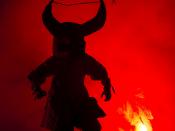The Odysseus who leaves Troy changes into a completely different man before he arrives at his home in Ithaca. The hero endures many trials and tribulations induced by the menis of Poseidon, but learns from his mistakes and matures much through his trek. Poseidon serves as a symbol of the supernatural and the threatening. In a way, he is the abusive, but pedagogic father. It is Poseidon who keeps Odysseus in the face of danger, and it is Poseidon who keeps him suffering. Until the seventh year of Calypso, Athena does nothing and observes patiently. She is the gentle and guiding mother. She stops the father from killing the son, but lets the son gain wisdom through his suffering. It is only when the hero gains enough wisdom that she allows him to return to Ithaca and reclaim his domain.
The first lesson is taught to Odysseus by the hostility of Polyphemus. His experience teaches him that the world is not the same in all places. On the Cyclopes' island, Odysseus assumes xenia even though he does not know the lay of the land or anything about its inhabitants. Upon setting foot in Polyphemus' cave, he and his men almost immediately begin feasting on the cyclops' milk and cheeses. When Polyphemus returns, he asks the men who they are and why they are dining in his cave. Odysseus answers to him, "we are here at your knees, asking you to offer us a token of welcome or to make us a gift such as strangers have a right to receive." Odysseus' rash assumption of xenia leads to six of his men eaten by Polyphemus during the whole encounter.
In Phaecia Odysseus recounts how
"my men were begging me... to go back and sail over the salt sea.


